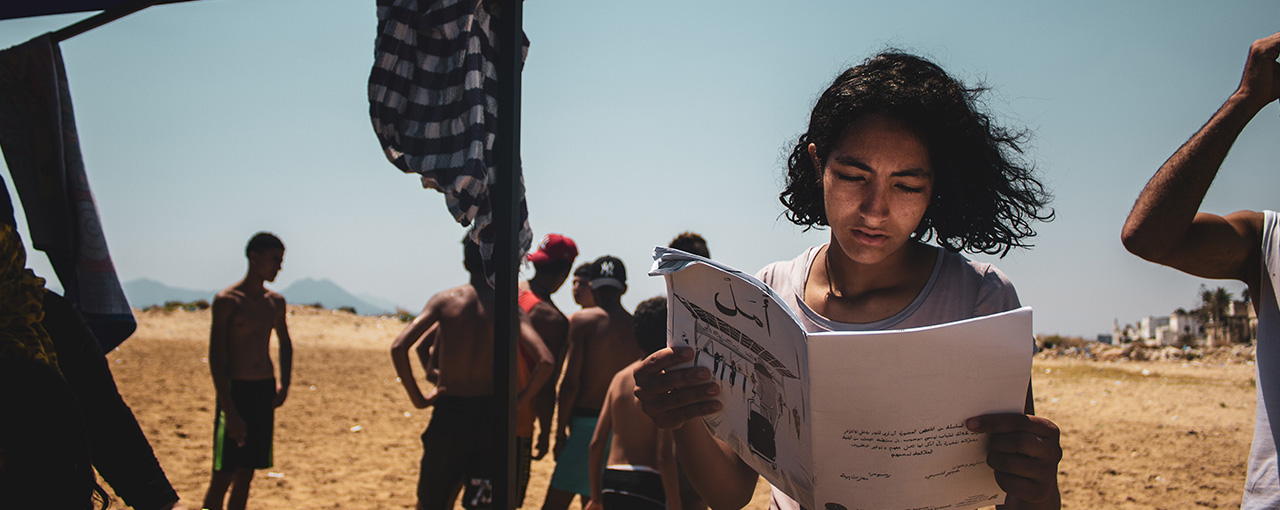
This article is published as part of AP’s work in support of the Youth, Peace and Security agenda, as defined by UN Security Council Resolution 2250 (2015). To learn more about our work and read the other articles published, please click here.
Young Tunisians took to the streets in 2011 after Mohamed Bouazizi, a street vendor, set himself on fire to protest against the oppressive regime of then President Ben Ali, which had been in power since the late 1980’s. Yet, today those same youngsters are less politically engaged than ever before, seen in an all-time low youth political participation. Some feel that this apathy stems from a lack of trust in the political élite due to a multitude of problems that continue to plague the country. In fact, the only country to have successfully undergone a democratic transition following the Arab Springs, today Tunisia is faced with a dire economic situation, political instability and the problem of returning foreign fighters from Syria.
This past March, the Johns Hopkins School of Advanced International Studies (SAIS) organized a visit to Tunis to shed light on the situation young Tunisians are faced with. As a member of the trip, I had the chance to talk with members of Tunisian society and document their opinions on past events, as well as their outlook on the future. I found most people excited and optimistic to transition away from dictatorship; however, difficult obstacles still lay ahead, obstacles that affect the morale of young Tunisians who continue to fight for democracy.
Finding employment remains the main preoccupation for youth, amid growing levels of instability for the economy as a whole. Over 35% of Tunisia’s youth is unemployed today, with peaks reaching almost 50% in rural areas. Additionally, Tunisia’s public debt has increased by 30% since the beginning of the Arab uprising, and inflation has reached 8%, the highest since the early 1990’s, according to the International Monetary Fund (IMF). Following new loans, the IMF is now holding a tight grip over Tunisia’s economy, calling for the layoff of public employees, who represent about 40% of total jobs in the country. Against the backdrop of this difficult economic situation, young Tunisian graduates are increasingly worried about what future lies ahead for them in their country. In fact, students I met from the Southern Mediterranean University admitted they will look for employment elsewhere, either in Europe or in the Gulf countries. Thus, the already high brain drain Tunisia is experiencing is likely to increase if the government is unable to create more jobs.
Young Tunisians are also worried about the government’s inability to remain stable. Many feel that stability, in a new democracy such as Tunisia, is vital for establishing strong democratic institutions; without these, economic progress will be difficult to reach. Yet, the country has mostly experienced upheaval since Ben Ali’s demise. The religious Ennahada party won the first democratic elections in 2011, but was soon ousted by the ruling secularist party, Nidaa Tounes. Several foreign analysts I met claimed that the current political system is crippled by a lack of clarity regarding the goals of each single party, with the exception of Ennahada, who has shown both a willingness to compromise as well as a cohesive political agenda. Ennahada remains, in fact, the strongest party ahead of the upcoming parliamentary elections (planned in October 2019). However, the Ennahada party is also somewhat of a controversial political entity because of its Islamist roots and rather conservative views.
This conservativism has left many youngsters disillusioned and unwilling to participate in the country’s political life. Organizations such as the NGO Al Bawsala try to maintain the fervor around the 2011 revolution by raising awareness, especially among youth, on the activities of the current parliament. They do this by, among other things, maintaining a strong social media presence. However, even if NGOs and associations such as Al Bawsala are doing their best to instill a sense of civic duty among the younger generation (who, we should remember, are not accustomed to voting), public opinion is in general still very disappointed by the lack of political participation of youth, who are seen as the main movers and shakers of the revolution.
Lastly, security has been a recurrent theme for nearly all young Tunisians I spoke to. Since the revolution, Tunisia has been targeted by a series of terrorist attacks that caused many victims, the first of which occurred at the Bardo Museum in March 2015. Terrorism has negatively impacted the economy, heavily reliant upon tourism. Tunisia is also known for being the country with the highest number of foreign fighters per capita, with approximately 6,000 combatants known to have left for Syria to fight for the Islamic State. Members from a local NGO seeking to counter violent extremism explained that such magnitude in departures may be linked to the high freedom of movement in the country after the dictatorship fell. Another explanation is linked to the newly acquired freedom of expression, as extremist groups that were once silenced under the Ben Ali regime suddenly had the chance to preach freely and recruit for the Islamic State. As the country faces questions about what to do with the returning foreign fighters, young people seem to be split regarding this subject, between those who believe they must be rehabilitated in society, and those who want to see them locked away. However, young Tunisians are also worried that issues linked to the returning fighters may overshadow more pressing matters, mainly those linked to Tunisia’s economy.
Transition to democracy is clearly not an easy task: the stability that Tunisians once benefited from is gone, and while some may miss it, many still remember how this had been the result of years of dictatorship under a regime that was in particular unable to keep up with the needs and concerns of the increasingly young population. In fact, youngsters took to the streets to topple this regime, a sign that demonstrated their strong eagerness to change. Every conversation I had shows that young people today still feel the need to take matters into their own hands and increase their political engagement; but structural barriers remain largely unchanged from pre-revolutionary times, including around economic and political empowerment. These should perhaps be the priorities to address in the future, or else Tunisia at large may be submerged by a disillusionment that will be hard to overcome.
Alissa Pavia is an Master of Arts candidate in Conflict Management and International Economics at the Johns Hopkins University of Advanced International Studies. She previously worked for various think tanks and NGOs in Brussels, where she mainly focused on counter-radicalization initiatives and the Middle East. She holds a BA from the University of Milan.
Photo: “The Adventures of Daly: Graphic Novel Campaign“, Search for Common Ground, 2019.





























